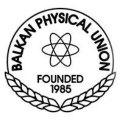Speaker
Description
It is found from viscous hydrodynamics that the QGP created in ultra relativistic heavy-ion collisions has different longitudinal and transverse pressures at early times. This occurs due to the large momentum space anisotropy in the p_T-p_L plane. This momentum space anisotropy can cause plasma instabilities that are largely responsible for the thermalization and isotropization of the system. Additionally, the production of a very strong magnetic field created in the non-central heavy-ion collisions naturally motivates one to ask if the dynamics of the anisotropic QGP gets affected by the magnetic field. We systematically study the collective modes of gluon using the generalized 'Romatschke-Strickland' form of the distribution functions in the presence of a magnetic field. Studying the behavior of the unstable modes, We may conclude that the magnetic field and the anisotropy behave in an opposite manner which is contrary to one's intuition.

